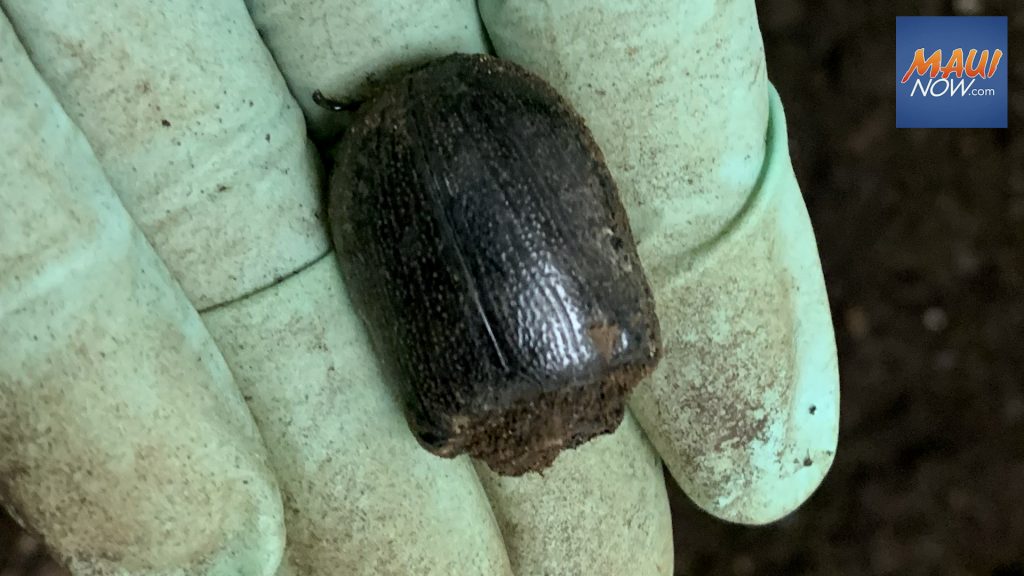Dead coconut rhinoceros beetle found on Maui

One dead coconut rhinoceros beetle was found on Monday among compost bags at a Maui big-box store, by staff from the Hawai‘i Department of Agriculture.
Staff from HDOA’s Plant Pest Control Branch (PPC) and Plant Quarantine Branch were conducting a routine survey at the store when they noticed a hole in one of the compost bags and upon further investigation, found one dead CRB.

Fifteen pallets of the bagged compost were voluntarily placed in quarantine by the store and all pallets were contained and are being shipped back to O‘ahu, where the product originated. No live beetles have been detected on Maui.
Immediately after the discovery on Maui, HDOA’s PQB inspectors on Maui and Hawai‘i Island were dispatched to other retailers and pallets of the compost bags from the same company were also quarantined and will be shipped back to O‘ahu. PQB staff on Kaua‘i are also surveying retailers on that island.

“We appreciate the cooperation of the retailers, distributors and manufacturers in helping to contain the situation and prevent the spread of CRB in the state,” said Dexter Kishida, deputy to the HDOA Chairperson. “The Department of Agriculture continues to work with mulch and compost companies on O‘ahu to prevent the movement of the beetle to uninfested areas.”
Anyone who has recently purchased locally produced compost from a big-box retailer on Maui may return the product to the store. Or, locally produced compost product may be dropped off at the Maui PQB offices:
- 635 Mua Street, in Kahului. Monday through Friday, 7:45 a.m. to 4:30 p.m.
- Maui Plant Quarantine Inspection Office, Kahului Airport (next to the Aloha Air Cargo Office on Haleakalā Hwy.), every day from 7:45 a.m. to 4:30 p.m.
If the product is not in a returnable state, each bag of the product may be double-bagged and sealed in dark-colored, heavy-duty plastic bags. The sealed bags should be placed on a concrete slab or asphalt that gets direct sunlight for five consecutive days.
Green waste provides an optimal breeding environment for CRB and residents on all islands are urged to check their compost bins and green waste for CRB larvae. In an effort to stop the spread of CRB to neighbor islands, HDOA will be reissuing an interim rule, originally issued in July 2022, restricting the movement of CRB host material from O‘ahu to neighbor islands. CRB host material includes, but is not limited to: palm plants; decomposing plant material such as compost, wood or tree chips, and mulch; plant-growing media (potting soils, etc.); and other products containing organic plant material.
CRB was first detected in Hawai‘i in Dec. 2013 on O‘ahu and has gradually spread from Central and West O‘ahu to the North Shore and the windward side.
On Kaua‘i in late May 2023, a live CRB was detected in a trap on Kaua‘i by a survey crew from the Kaua‘i Invasive Species Committee (KISC). So far, nine CRB adults and four larvae have been detected on Kaua‘i. Efforts on the island to detect and eradicate CRB are ongoing, with the assistance of the KISC and the County of Kaua‘i.
Surveillance for CRB has been ongoing on all neighbor islands, including pheromone traps at airports, harbors and other strategic locations. The traps are used for early detection of CRB infestations. More than 3,000 CRB traps have been deployed around O‘ahu to track infestation areas.
CRB is a serious pest of palm trees, primarily coconut palms, as the adult beetles bore into the crowns of the palms to feed on the tree’s sap. New unopened fronds are damaged in this way and when fully opened, may break and fall unexpectedly. If CRB kill or damage the growing point of the palm, the tree may die. Secondary fungal or bacterial pathogens may also attack the wounds caused by CRB, thereby killing the tree as well. Tree mortality after CRB attack has been reported to be anywhere from 10 percent to 50 percent. Dead trees then become a safety hazard as they may fall unexpectedly after the trunk rots, potentially resulting in bodily injury or property damage.
It is a major pest of palms in India, the Philippines, Palau, Fiji, Wallis, Nukunono, American and Western Samoa and Guam. It is still not known exactly how the beetles arrived in Hawai‘i.
Reports of possible CRB infestation may be addressed to the CRB Response Team at (808) 679-5244 or email info@crbhawaii.org or the state’s toll-free Pest Hotline at (808) 643-PEST (7378).








